Unilever: Leadership, Management, and Operations Analysis Report
VerifiedAdded on 2023/01/06
|16
|5062
|22
Report
AI Summary
This report provides a comprehensive analysis of management and operations at Unilever, a multinational consumer goods company. It begins with an introduction to management and operations, differentiating between the roles and characteristics of managers and leaders. The report examines how leadership and managerial functions are applied in various situations, such as performance management and change management, with specific examples from Unilever. It then applies various leadership theories and models, including situational leadership, system leadership, and contingency theory, to the context of Unilever's operations. The second part of the report focuses on key approaches to operations management and the roles of leaders and managers in this area, emphasizing the importance and value of operational management. Furthermore, it evaluates the factors within the business environment that affect operational management and decision-making by leaders and managers. The report concludes with a summary of the findings and references relevant sources.
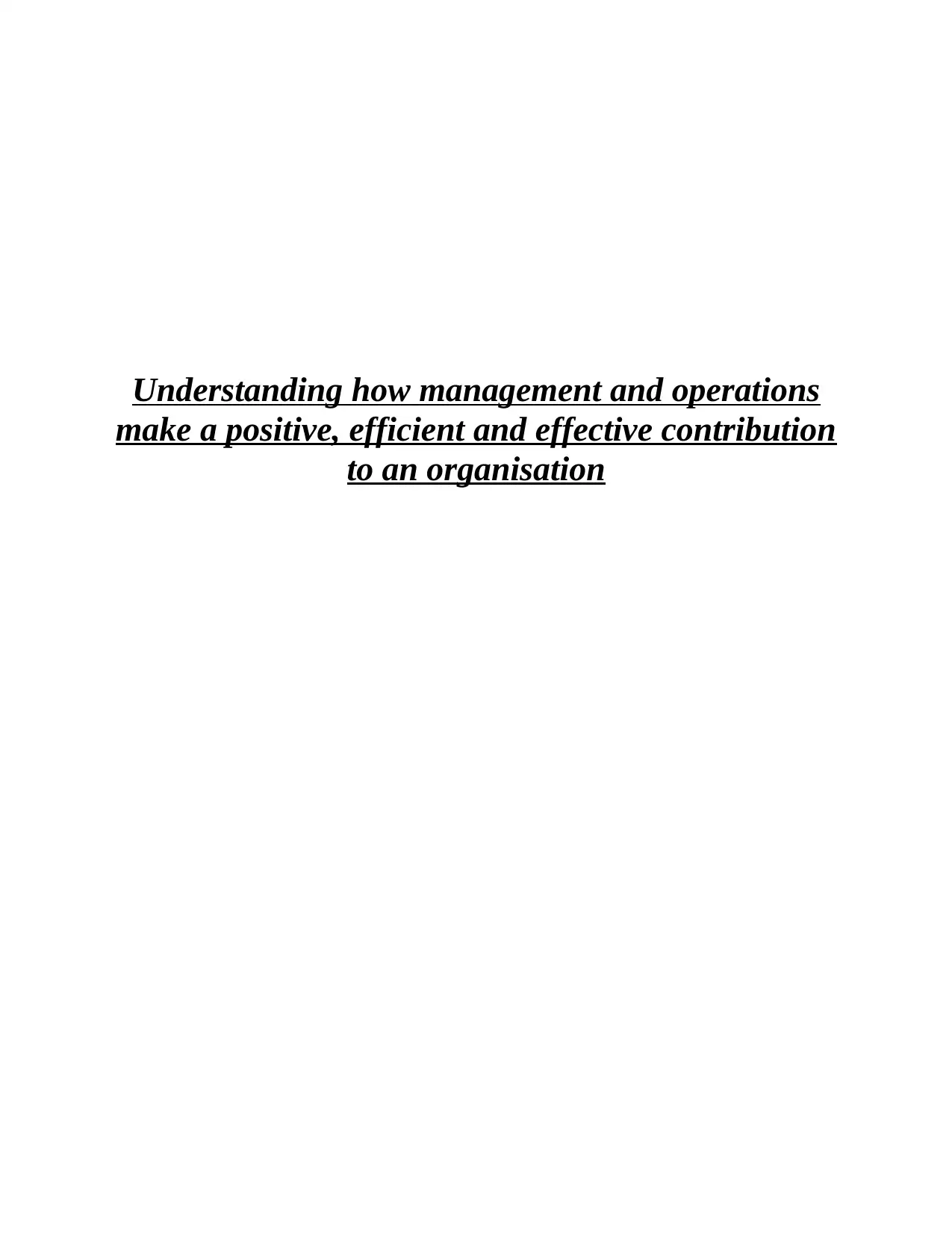
Understanding how management and operations
make a positive, efficient and effective contribution
to an organisation
make a positive, efficient and effective contribution
to an organisation
Paraphrase This Document
Need a fresh take? Get an instant paraphrase of this document with our AI Paraphraser
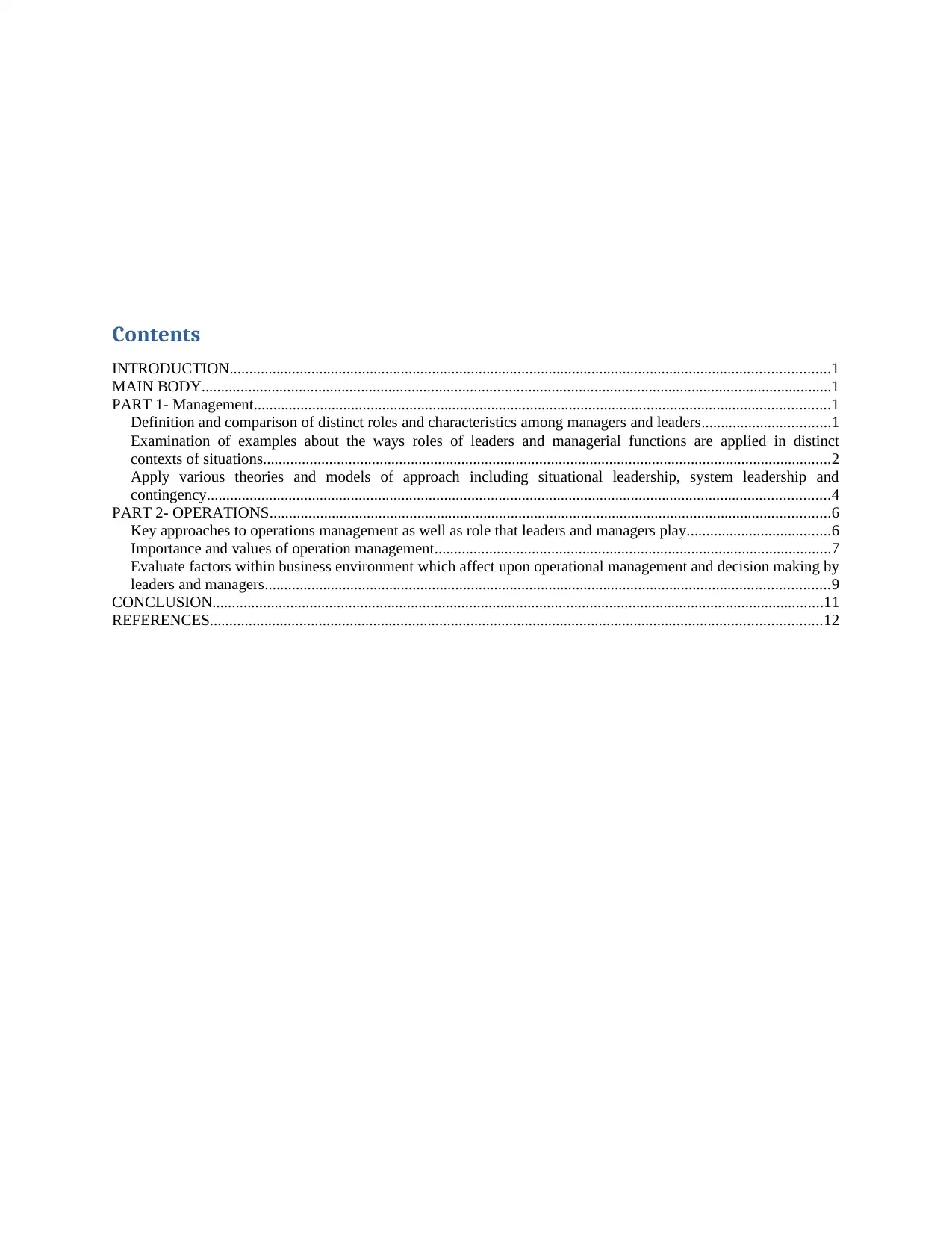
Contents
INTRODUCTION..........................................................................................................................................................1
MAIN BODY..................................................................................................................................................................1
PART 1- Management....................................................................................................................................................1
Definition and comparison of distinct roles and characteristics among managers and leaders.................................1
Examination of examples about the ways roles of leaders and managerial functions are applied in distinct
contexts of situations..................................................................................................................................................2
Apply various theories and models of approach including situational leadership, system leadership and
contingency................................................................................................................................................................4
PART 2- OPERATIONS................................................................................................................................................6
Key approaches to operations management as well as role that leaders and managers play.....................................6
Importance and values of operation management......................................................................................................7
Evaluate factors within business environment which affect upon operational management and decision making by
leaders and managers.................................................................................................................................................9
CONCLUSION.............................................................................................................................................................11
REFERENCES.............................................................................................................................................................12
INTRODUCTION..........................................................................................................................................................1
MAIN BODY..................................................................................................................................................................1
PART 1- Management....................................................................................................................................................1
Definition and comparison of distinct roles and characteristics among managers and leaders.................................1
Examination of examples about the ways roles of leaders and managerial functions are applied in distinct
contexts of situations..................................................................................................................................................2
Apply various theories and models of approach including situational leadership, system leadership and
contingency................................................................................................................................................................4
PART 2- OPERATIONS................................................................................................................................................6
Key approaches to operations management as well as role that leaders and managers play.....................................6
Importance and values of operation management......................................................................................................7
Evaluate factors within business environment which affect upon operational management and decision making by
leaders and managers.................................................................................................................................................9
CONCLUSION.............................................................................................................................................................11
REFERENCES.............................................................................................................................................................12
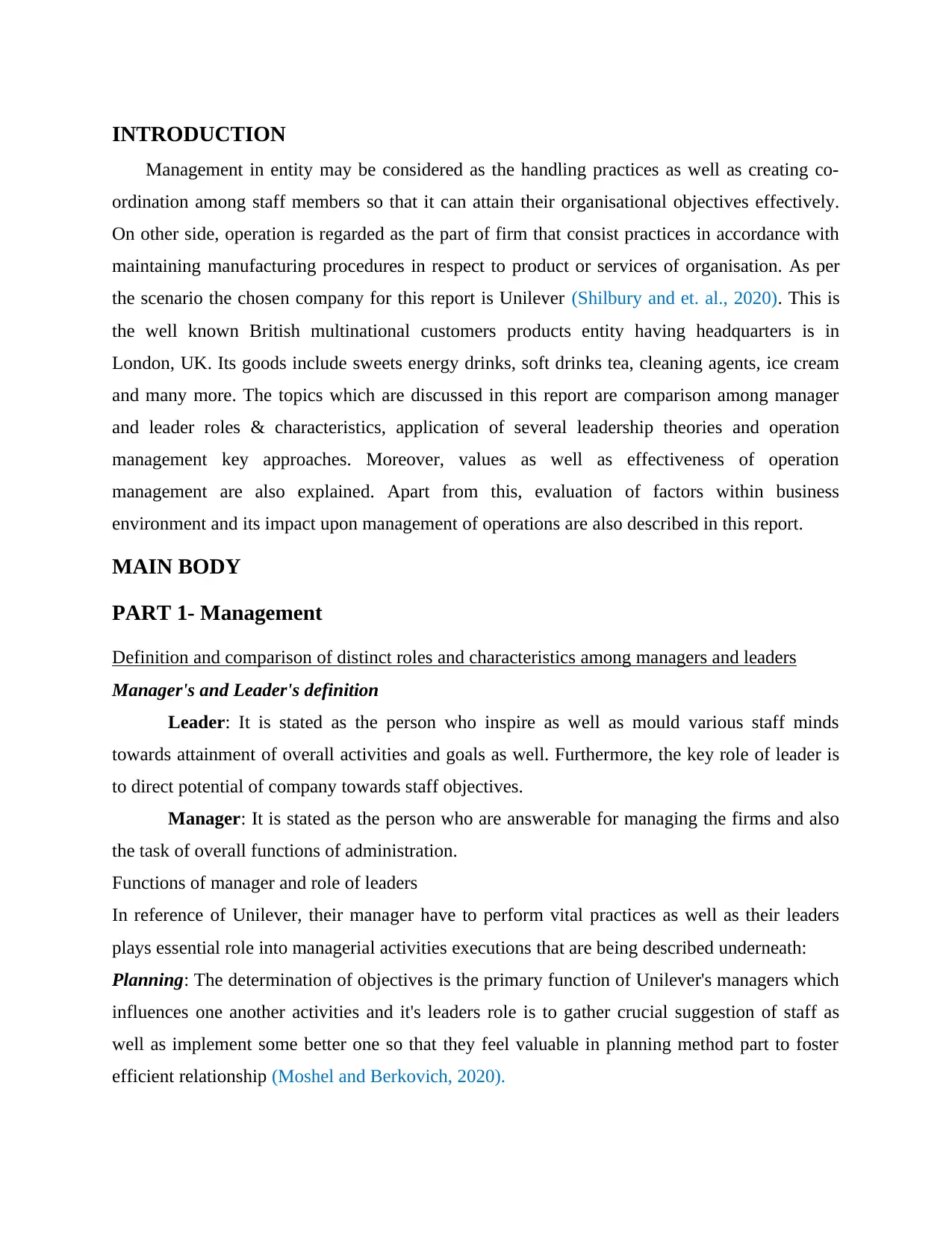
INTRODUCTION
Management in entity may be considered as the handling practices as well as creating co-
ordination among staff members so that it can attain their organisational objectives effectively.
On other side, operation is regarded as the part of firm that consist practices in accordance with
maintaining manufacturing procedures in respect to product or services of organisation. As per
the scenario the chosen company for this report is Unilever (Shilbury and et. al., 2020). This is
the well known British multinational customers products entity having headquarters is in
London, UK. Its goods include sweets energy drinks, soft drinks tea, cleaning agents, ice cream
and many more. The topics which are discussed in this report are comparison among manager
and leader roles & characteristics, application of several leadership theories and operation
management key approaches. Moreover, values as well as effectiveness of operation
management are also explained. Apart from this, evaluation of factors within business
environment and its impact upon management of operations are also described in this report.
MAIN BODY
PART 1- Management
Definition and comparison of distinct roles and characteristics among managers and leaders
Manager's and Leader's definition
Leader: It is stated as the person who inspire as well as mould various staff minds
towards attainment of overall activities and goals as well. Furthermore, the key role of leader is
to direct potential of company towards staff objectives.
Manager: It is stated as the person who are answerable for managing the firms and also
the task of overall functions of administration.
Functions of manager and role of leaders
In reference of Unilever, their manager have to perform vital practices as well as their leaders
plays essential role into managerial activities executions that are being described underneath:
Planning: The determination of objectives is the primary function of Unilever's managers which
influences one another activities and it's leaders role is to gather crucial suggestion of staff as
well as implement some better one so that they feel valuable in planning method part to foster
efficient relationship (Moshel and Berkovich, 2020).
Management in entity may be considered as the handling practices as well as creating co-
ordination among staff members so that it can attain their organisational objectives effectively.
On other side, operation is regarded as the part of firm that consist practices in accordance with
maintaining manufacturing procedures in respect to product or services of organisation. As per
the scenario the chosen company for this report is Unilever (Shilbury and et. al., 2020). This is
the well known British multinational customers products entity having headquarters is in
London, UK. Its goods include sweets energy drinks, soft drinks tea, cleaning agents, ice cream
and many more. The topics which are discussed in this report are comparison among manager
and leader roles & characteristics, application of several leadership theories and operation
management key approaches. Moreover, values as well as effectiveness of operation
management are also explained. Apart from this, evaluation of factors within business
environment and its impact upon management of operations are also described in this report.
MAIN BODY
PART 1- Management
Definition and comparison of distinct roles and characteristics among managers and leaders
Manager's and Leader's definition
Leader: It is stated as the person who inspire as well as mould various staff minds
towards attainment of overall activities and goals as well. Furthermore, the key role of leader is
to direct potential of company towards staff objectives.
Manager: It is stated as the person who are answerable for managing the firms and also
the task of overall functions of administration.
Functions of manager and role of leaders
In reference of Unilever, their manager have to perform vital practices as well as their leaders
plays essential role into managerial activities executions that are being described underneath:
Planning: The determination of objectives is the primary function of Unilever's managers which
influences one another activities and it's leaders role is to gather crucial suggestion of staff as
well as implement some better one so that they feel valuable in planning method part to foster
efficient relationship (Moshel and Berkovich, 2020).
⊘ This is a preview!⊘
Do you want full access?
Subscribe today to unlock all pages.

Trusted by 1+ million students worldwide
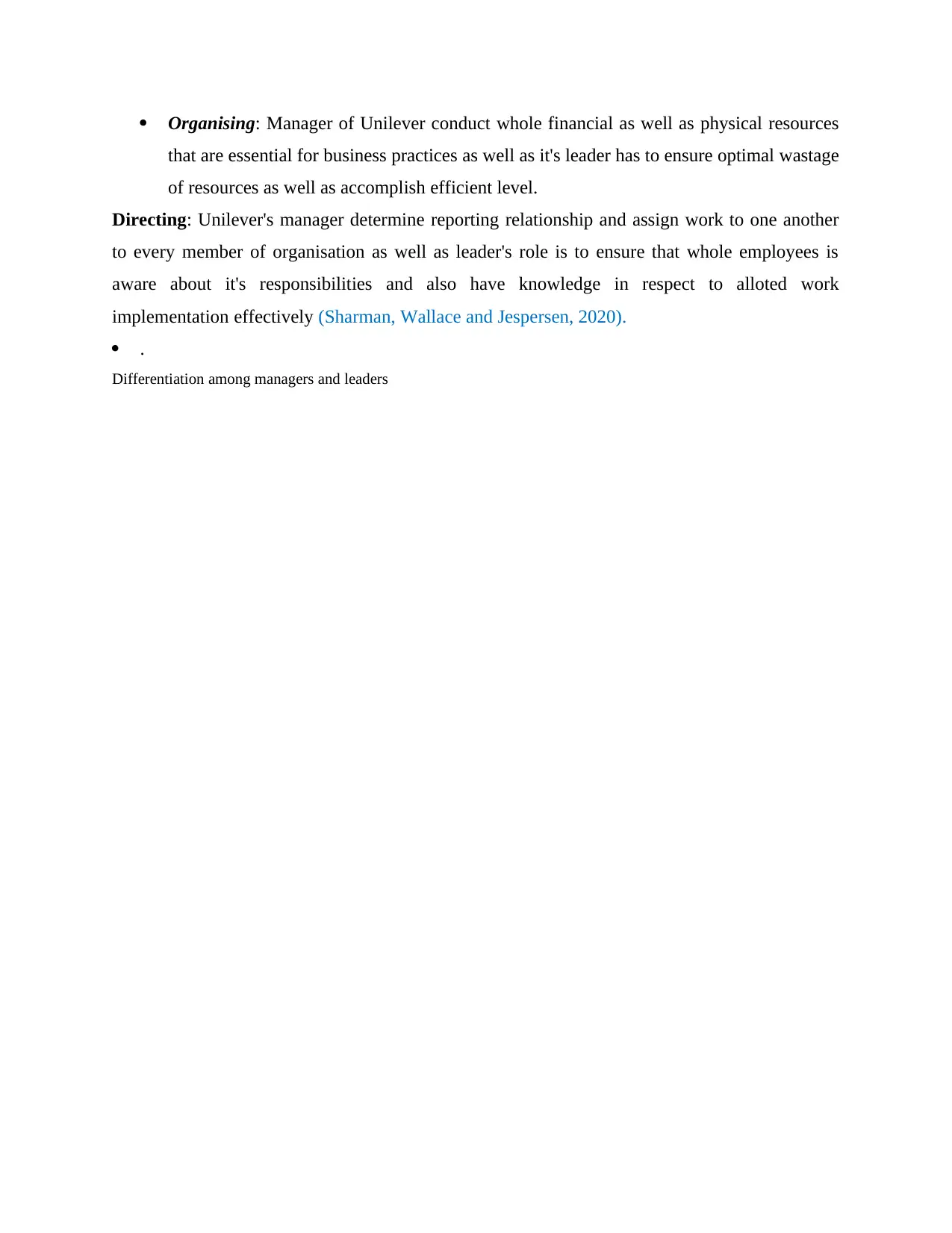
Organising: Manager of Unilever conduct whole financial as well as physical resources
that are essential for business practices as well as it's leader has to ensure optimal wastage
of resources as well as accomplish efficient level.
Directing: Unilever's manager determine reporting relationship and assign work to one another
to every member of organisation as well as leader's role is to ensure that whole employees is
aware about it's responsibilities and also have knowledge in respect to alloted work
implementation effectively (Sharman, Wallace and Jespersen, 2020).
.
Differentiation among managers and leaders
that are essential for business practices as well as it's leader has to ensure optimal wastage
of resources as well as accomplish efficient level.
Directing: Unilever's manager determine reporting relationship and assign work to one another
to every member of organisation as well as leader's role is to ensure that whole employees is
aware about it's responsibilities and also have knowledge in respect to alloted work
implementation effectively (Sharman, Wallace and Jespersen, 2020).
.
Differentiation among managers and leaders
Paraphrase This Document
Need a fresh take? Get an instant paraphrase of this document with our AI Paraphraser
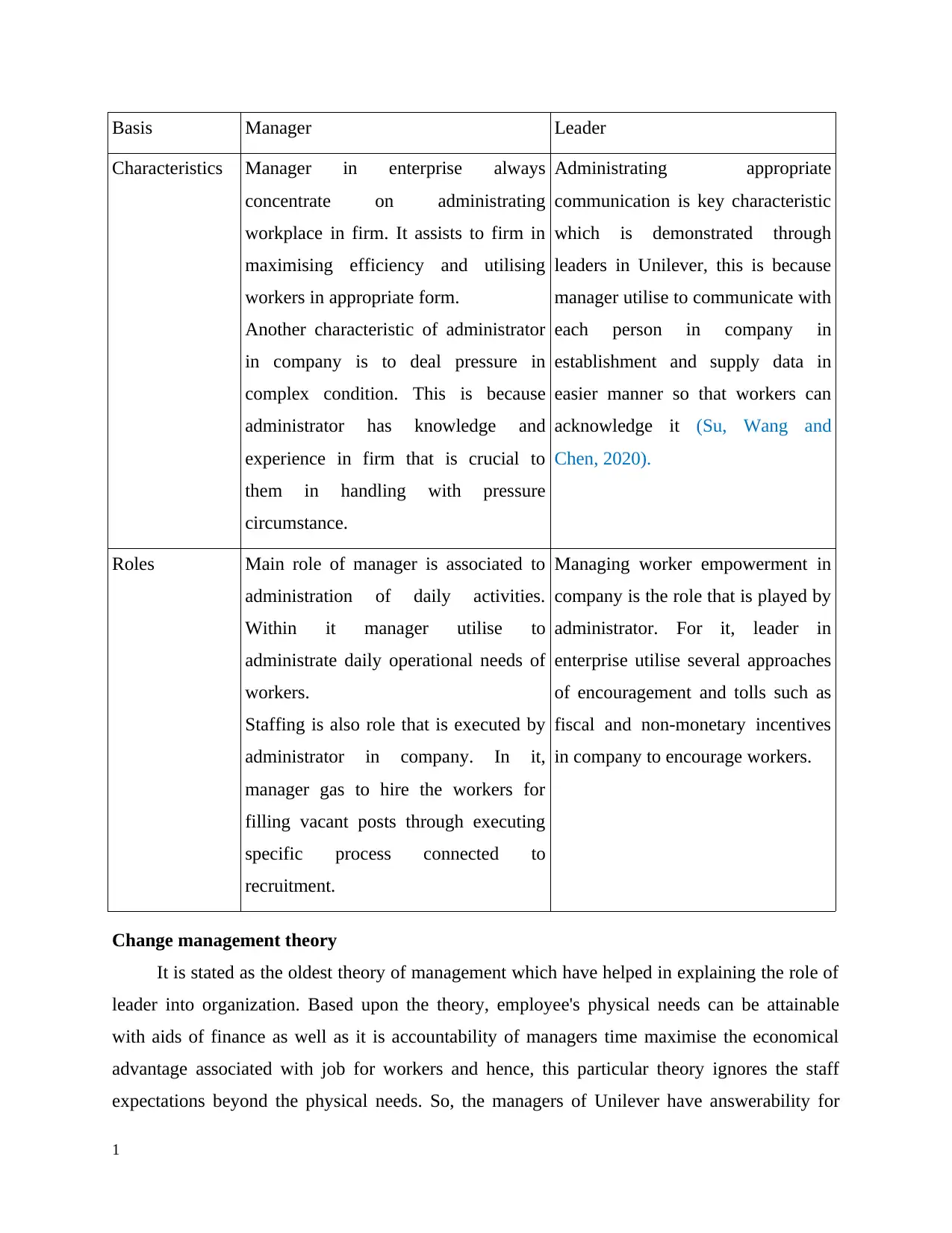
Basis Manager Leader
Characteristics Manager in enterprise always
concentrate on administrating
workplace in firm. It assists to firm in
maximising efficiency and utilising
workers in appropriate form.
Another characteristic of administrator
in company is to deal pressure in
complex condition. This is because
administrator has knowledge and
experience in firm that is crucial to
them in handling with pressure
circumstance.
Administrating appropriate
communication is key characteristic
which is demonstrated through
leaders in Unilever, this is because
manager utilise to communicate with
each person in company in
establishment and supply data in
easier manner so that workers can
acknowledge it (Su, Wang and
Chen, 2020).
Roles Main role of manager is associated to
administration of daily activities.
Within it manager utilise to
administrate daily operational needs of
workers.
Staffing is also role that is executed by
administrator in company. In it,
manager gas to hire the workers for
filling vacant posts through executing
specific process connected to
recruitment.
Managing worker empowerment in
company is the role that is played by
administrator. For it, leader in
enterprise utilise several approaches
of encouragement and tolls such as
fiscal and non-monetary incentives
in company to encourage workers.
Change management theory
It is stated as the oldest theory of management which have helped in explaining the role of
leader into organization. Based upon the theory, employee's physical needs can be attainable
with aids of finance as well as it is accountability of managers time maximise the economical
advantage associated with job for workers and hence, this particular theory ignores the staff
expectations beyond the physical needs. So, the managers of Unilever have answerability for
1
Characteristics Manager in enterprise always
concentrate on administrating
workplace in firm. It assists to firm in
maximising efficiency and utilising
workers in appropriate form.
Another characteristic of administrator
in company is to deal pressure in
complex condition. This is because
administrator has knowledge and
experience in firm that is crucial to
them in handling with pressure
circumstance.
Administrating appropriate
communication is key characteristic
which is demonstrated through
leaders in Unilever, this is because
manager utilise to communicate with
each person in company in
establishment and supply data in
easier manner so that workers can
acknowledge it (Su, Wang and
Chen, 2020).
Roles Main role of manager is associated to
administration of daily activities.
Within it manager utilise to
administrate daily operational needs of
workers.
Staffing is also role that is executed by
administrator in company. In it,
manager gas to hire the workers for
filling vacant posts through executing
specific process connected to
recruitment.
Managing worker empowerment in
company is the role that is played by
administrator. For it, leader in
enterprise utilise several approaches
of encouragement and tolls such as
fiscal and non-monetary incentives
in company to encourage workers.
Change management theory
It is stated as the oldest theory of management which have helped in explaining the role of
leader into organization. Based upon the theory, employee's physical needs can be attainable
with aids of finance as well as it is accountability of managers time maximise the economical
advantage associated with job for workers and hence, this particular theory ignores the staff
expectations beyond the physical needs. So, the managers of Unilever have answerability for
1
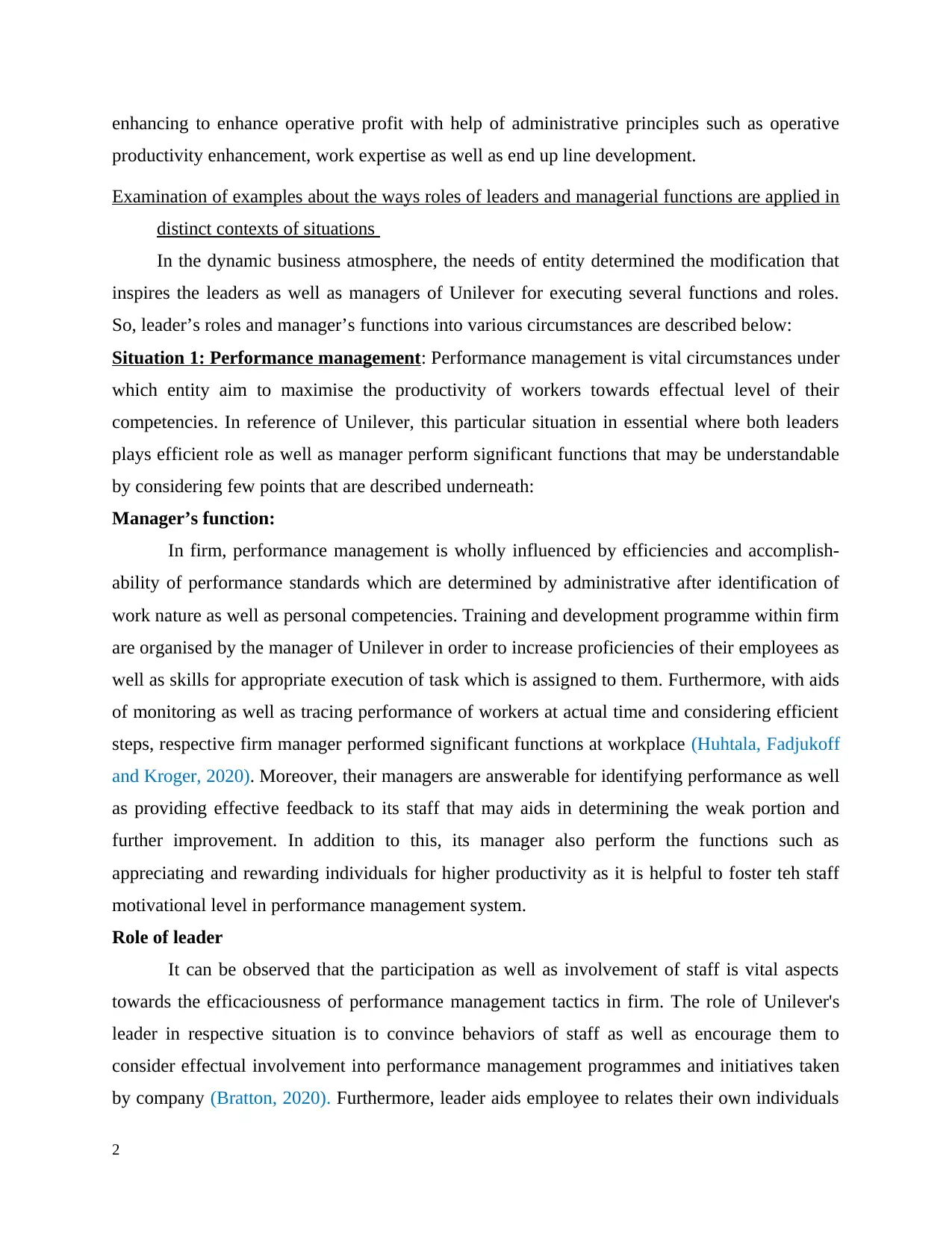
enhancing to enhance operative profit with help of administrative principles such as operative
productivity enhancement, work expertise as well as end up line development.
Examination of examples about the ways roles of leaders and managerial functions are applied in
distinct contexts of situations
In the dynamic business atmosphere, the needs of entity determined the modification that
inspires the leaders as well as managers of Unilever for executing several functions and roles.
So, leader’s roles and manager’s functions into various circumstances are described below:
Situation 1: Performance management: Performance management is vital circumstances under
which entity aim to maximise the productivity of workers towards effectual level of their
competencies. In reference of Unilever, this particular situation in essential where both leaders
plays efficient role as well as manager perform significant functions that may be understandable
by considering few points that are described underneath:
Manager’s function:
In firm, performance management is wholly influenced by efficiencies and accomplish-
ability of performance standards which are determined by administrative after identification of
work nature as well as personal competencies. Training and development programme within firm
are organised by the manager of Unilever in order to increase proficiencies of their employees as
well as skills for appropriate execution of task which is assigned to them. Furthermore, with aids
of monitoring as well as tracing performance of workers at actual time and considering efficient
steps, respective firm manager performed significant functions at workplace (Huhtala, Fadjukoff
and Kroger, 2020). Moreover, their managers are answerable for identifying performance as well
as providing effective feedback to its staff that may aids in determining the weak portion and
further improvement. In addition to this, its manager also perform the functions such as
appreciating and rewarding individuals for higher productivity as it is helpful to foster teh staff
motivational level in performance management system.
Role of leader
It can be observed that the participation as well as involvement of staff is vital aspects
towards the efficaciousness of performance management tactics in firm. The role of Unilever's
leader in respective situation is to convince behaviors of staff as well as encourage them to
consider effectual involvement into performance management programmes and initiatives taken
by company (Bratton, 2020). Furthermore, leader aids employee to relates their own individuals
2
productivity enhancement, work expertise as well as end up line development.
Examination of examples about the ways roles of leaders and managerial functions are applied in
distinct contexts of situations
In the dynamic business atmosphere, the needs of entity determined the modification that
inspires the leaders as well as managers of Unilever for executing several functions and roles.
So, leader’s roles and manager’s functions into various circumstances are described below:
Situation 1: Performance management: Performance management is vital circumstances under
which entity aim to maximise the productivity of workers towards effectual level of their
competencies. In reference of Unilever, this particular situation in essential where both leaders
plays efficient role as well as manager perform significant functions that may be understandable
by considering few points that are described underneath:
Manager’s function:
In firm, performance management is wholly influenced by efficiencies and accomplish-
ability of performance standards which are determined by administrative after identification of
work nature as well as personal competencies. Training and development programme within firm
are organised by the manager of Unilever in order to increase proficiencies of their employees as
well as skills for appropriate execution of task which is assigned to them. Furthermore, with aids
of monitoring as well as tracing performance of workers at actual time and considering efficient
steps, respective firm manager performed significant functions at workplace (Huhtala, Fadjukoff
and Kroger, 2020). Moreover, their managers are answerable for identifying performance as well
as providing effective feedback to its staff that may aids in determining the weak portion and
further improvement. In addition to this, its manager also perform the functions such as
appreciating and rewarding individuals for higher productivity as it is helpful to foster teh staff
motivational level in performance management system.
Role of leader
It can be observed that the participation as well as involvement of staff is vital aspects
towards the efficaciousness of performance management tactics in firm. The role of Unilever's
leader in respective situation is to convince behaviors of staff as well as encourage them to
consider effectual involvement into performance management programmes and initiatives taken
by company (Bratton, 2020). Furthermore, leader aids employee to relates their own individuals
2
⊘ This is a preview!⊘
Do you want full access?
Subscribe today to unlock all pages.

Trusted by 1+ million students worldwide
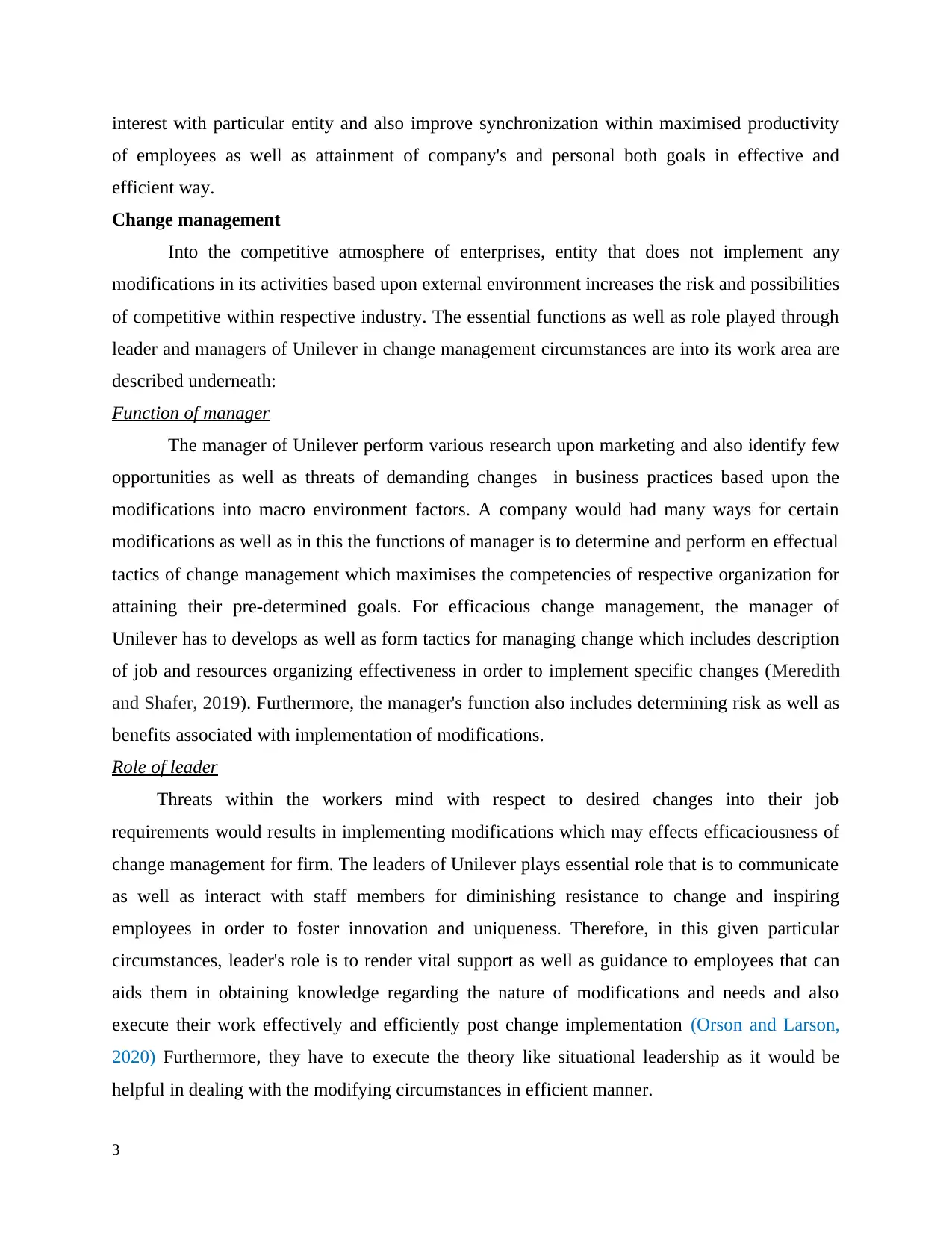
interest with particular entity and also improve synchronization within maximised productivity
of employees as well as attainment of company's and personal both goals in effective and
efficient way.
Change management
Into the competitive atmosphere of enterprises, entity that does not implement any
modifications in its activities based upon external environment increases the risk and possibilities
of competitive within respective industry. The essential functions as well as role played through
leader and managers of Unilever in change management circumstances are into its work area are
described underneath:
Function of manager
The manager of Unilever perform various research upon marketing and also identify few
opportunities as well as threats of demanding changes in business practices based upon the
modifications into macro environment factors. A company would had many ways for certain
modifications as well as in this the functions of manager is to determine and perform en effectual
tactics of change management which maximises the competencies of respective organization for
attaining their pre-determined goals. For efficacious change management, the manager of
Unilever has to develops as well as form tactics for managing change which includes description
of job and resources organizing effectiveness in order to implement specific changes (Meredith
and Shafer, 2019). Furthermore, the manager's function also includes determining risk as well as
benefits associated with implementation of modifications.
Role of leader
Threats within the workers mind with respect to desired changes into their job
requirements would results in implementing modifications which may effects efficaciousness of
change management for firm. The leaders of Unilever plays essential role that is to communicate
as well as interact with staff members for diminishing resistance to change and inspiring
employees in order to foster innovation and uniqueness. Therefore, in this given particular
circumstances, leader's role is to render vital support as well as guidance to employees that can
aids them in obtaining knowledge regarding the nature of modifications and needs and also
execute their work effectively and efficiently post change implementation (Orson and Larson,
2020) Furthermore, they have to execute the theory like situational leadership as it would be
helpful in dealing with the modifying circumstances in efficient manner.
3
of employees as well as attainment of company's and personal both goals in effective and
efficient way.
Change management
Into the competitive atmosphere of enterprises, entity that does not implement any
modifications in its activities based upon external environment increases the risk and possibilities
of competitive within respective industry. The essential functions as well as role played through
leader and managers of Unilever in change management circumstances are into its work area are
described underneath:
Function of manager
The manager of Unilever perform various research upon marketing and also identify few
opportunities as well as threats of demanding changes in business practices based upon the
modifications into macro environment factors. A company would had many ways for certain
modifications as well as in this the functions of manager is to determine and perform en effectual
tactics of change management which maximises the competencies of respective organization for
attaining their pre-determined goals. For efficacious change management, the manager of
Unilever has to develops as well as form tactics for managing change which includes description
of job and resources organizing effectiveness in order to implement specific changes (Meredith
and Shafer, 2019). Furthermore, the manager's function also includes determining risk as well as
benefits associated with implementation of modifications.
Role of leader
Threats within the workers mind with respect to desired changes into their job
requirements would results in implementing modifications which may effects efficaciousness of
change management for firm. The leaders of Unilever plays essential role that is to communicate
as well as interact with staff members for diminishing resistance to change and inspiring
employees in order to foster innovation and uniqueness. Therefore, in this given particular
circumstances, leader's role is to render vital support as well as guidance to employees that can
aids them in obtaining knowledge regarding the nature of modifications and needs and also
execute their work effectively and efficiently post change implementation (Orson and Larson,
2020) Furthermore, they have to execute the theory like situational leadership as it would be
helpful in dealing with the modifying circumstances in efficient manner.
3
Paraphrase This Document
Need a fresh take? Get an instant paraphrase of this document with our AI Paraphraser
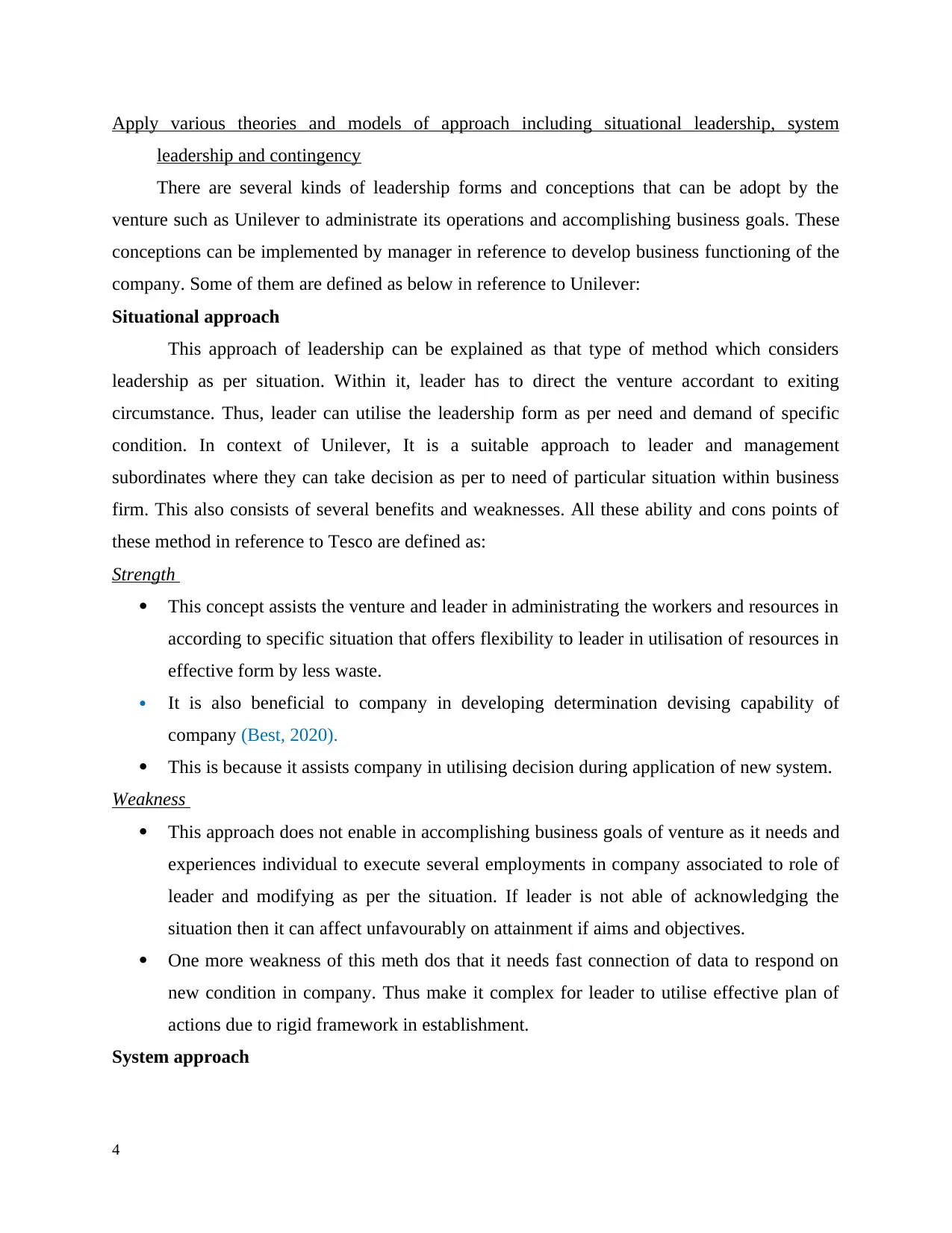
Apply various theories and models of approach including situational leadership, system
leadership and contingency
There are several kinds of leadership forms and conceptions that can be adopt by the
venture such as Unilever to administrate its operations and accomplishing business goals. These
conceptions can be implemented by manager in reference to develop business functioning of the
company. Some of them are defined as below in reference to Unilever:
Situational approach
This approach of leadership can be explained as that type of method which considers
leadership as per situation. Within it, leader has to direct the venture accordant to exiting
circumstance. Thus, leader can utilise the leadership form as per need and demand of specific
condition. In context of Unilever, It is a suitable approach to leader and management
subordinates where they can take decision as per to need of particular situation within business
firm. This also consists of several benefits and weaknesses. All these ability and cons points of
these method in reference to Tesco are defined as:
Strength
This concept assists the venture and leader in administrating the workers and resources in
according to specific situation that offers flexibility to leader in utilisation of resources in
effective form by less waste.
It is also beneficial to company in developing determination devising capability of
company (Best, 2020).
This is because it assists company in utilising decision during application of new system.
Weakness
This approach does not enable in accomplishing business goals of venture as it needs and
experiences individual to execute several employments in company associated to role of
leader and modifying as per the situation. If leader is not able of acknowledging the
situation then it can affect unfavourably on attainment if aims and objectives.
One more weakness of this meth dos that it needs fast connection of data to respond on
new condition in company. Thus make it complex for leader to utilise effective plan of
actions due to rigid framework in establishment.
System approach
4
leadership and contingency
There are several kinds of leadership forms and conceptions that can be adopt by the
venture such as Unilever to administrate its operations and accomplishing business goals. These
conceptions can be implemented by manager in reference to develop business functioning of the
company. Some of them are defined as below in reference to Unilever:
Situational approach
This approach of leadership can be explained as that type of method which considers
leadership as per situation. Within it, leader has to direct the venture accordant to exiting
circumstance. Thus, leader can utilise the leadership form as per need and demand of specific
condition. In context of Unilever, It is a suitable approach to leader and management
subordinates where they can take decision as per to need of particular situation within business
firm. This also consists of several benefits and weaknesses. All these ability and cons points of
these method in reference to Tesco are defined as:
Strength
This concept assists the venture and leader in administrating the workers and resources in
according to specific situation that offers flexibility to leader in utilisation of resources in
effective form by less waste.
It is also beneficial to company in developing determination devising capability of
company (Best, 2020).
This is because it assists company in utilising decision during application of new system.
Weakness
This approach does not enable in accomplishing business goals of venture as it needs and
experiences individual to execute several employments in company associated to role of
leader and modifying as per the situation. If leader is not able of acknowledging the
situation then it can affect unfavourably on attainment if aims and objectives.
One more weakness of this meth dos that it needs fast connection of data to respond on
new condition in company. Thus make it complex for leader to utilise effective plan of
actions due to rigid framework in establishment.
System approach
4
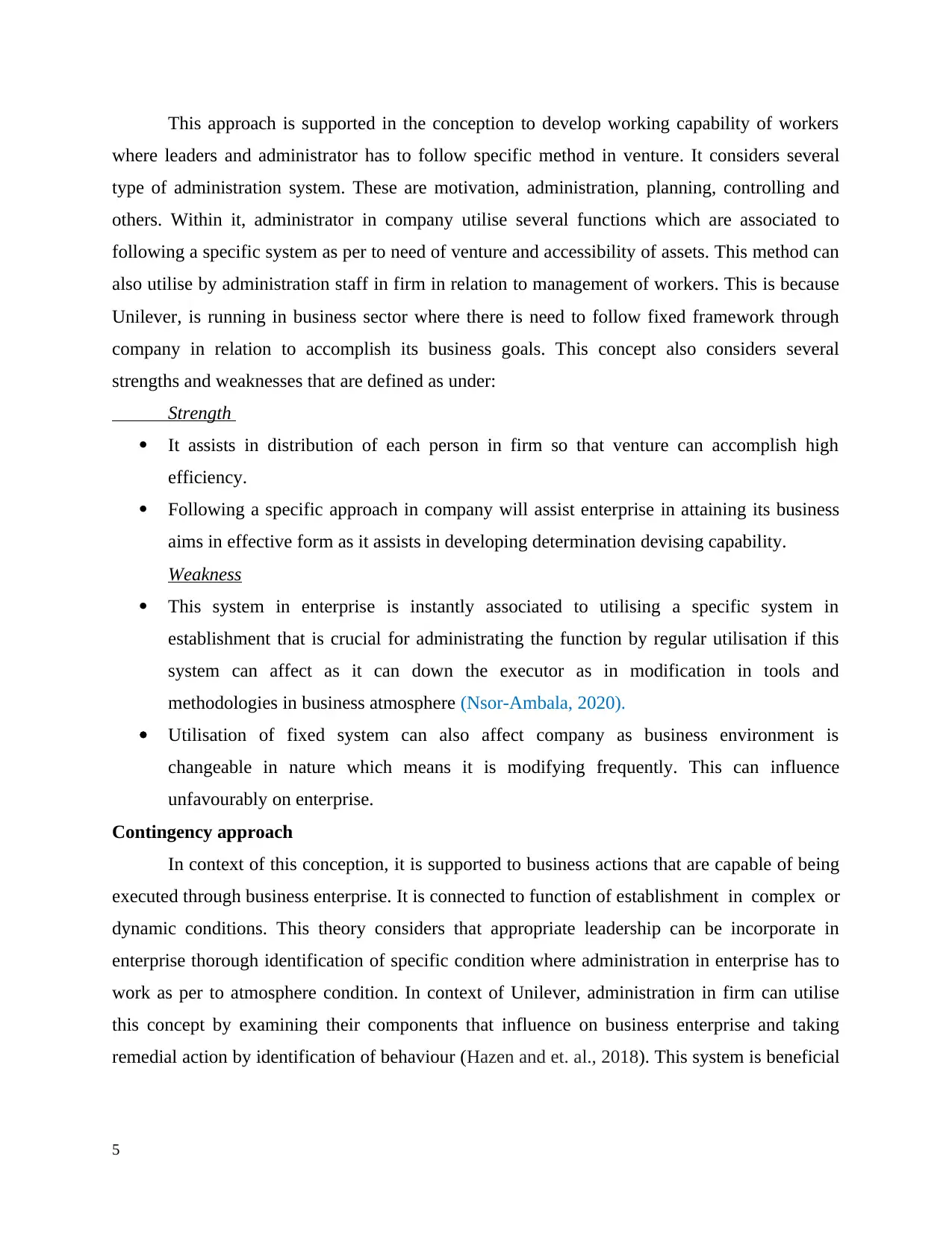
This approach is supported in the conception to develop working capability of workers
where leaders and administrator has to follow specific method in venture. It considers several
type of administration system. These are motivation, administration, planning, controlling and
others. Within it, administrator in company utilise several functions which are associated to
following a specific system as per to need of venture and accessibility of assets. This method can
also utilise by administration staff in firm in relation to management of workers. This is because
Unilever, is running in business sector where there is need to follow fixed framework through
company in relation to accomplish its business goals. This concept also considers several
strengths and weaknesses that are defined as under:
Strength
It assists in distribution of each person in firm so that venture can accomplish high
efficiency.
Following a specific approach in company will assist enterprise in attaining its business
aims in effective form as it assists in developing determination devising capability.
Weakness
This system in enterprise is instantly associated to utilising a specific system in
establishment that is crucial for administrating the function by regular utilisation if this
system can affect as it can down the executor as in modification in tools and
methodologies in business atmosphere (Nsor-Ambala, 2020).
Utilisation of fixed system can also affect company as business environment is
changeable in nature which means it is modifying frequently. This can influence
unfavourably on enterprise.
Contingency approach
In context of this conception, it is supported to business actions that are capable of being
executed through business enterprise. It is connected to function of establishment in complex or
dynamic conditions. This theory considers that appropriate leadership can be incorporate in
enterprise thorough identification of specific condition where administration in enterprise has to
work as per to atmosphere condition. In context of Unilever, administration in firm can utilise
this concept by examining their components that influence on business enterprise and taking
remedial action by identification of behaviour (Hazen and et. al., 2018). This system is beneficial
5
where leaders and administrator has to follow specific method in venture. It considers several
type of administration system. These are motivation, administration, planning, controlling and
others. Within it, administrator in company utilise several functions which are associated to
following a specific system as per to need of venture and accessibility of assets. This method can
also utilise by administration staff in firm in relation to management of workers. This is because
Unilever, is running in business sector where there is need to follow fixed framework through
company in relation to accomplish its business goals. This concept also considers several
strengths and weaknesses that are defined as under:
Strength
It assists in distribution of each person in firm so that venture can accomplish high
efficiency.
Following a specific approach in company will assist enterprise in attaining its business
aims in effective form as it assists in developing determination devising capability.
Weakness
This system in enterprise is instantly associated to utilising a specific system in
establishment that is crucial for administrating the function by regular utilisation if this
system can affect as it can down the executor as in modification in tools and
methodologies in business atmosphere (Nsor-Ambala, 2020).
Utilisation of fixed system can also affect company as business environment is
changeable in nature which means it is modifying frequently. This can influence
unfavourably on enterprise.
Contingency approach
In context of this conception, it is supported to business actions that are capable of being
executed through business enterprise. It is connected to function of establishment in complex or
dynamic conditions. This theory considers that appropriate leadership can be incorporate in
enterprise thorough identification of specific condition where administration in enterprise has to
work as per to atmosphere condition. In context of Unilever, administration in firm can utilise
this concept by examining their components that influence on business enterprise and taking
remedial action by identification of behaviour (Hazen and et. al., 2018). This system is beneficial
5
⊘ This is a preview!⊘
Do you want full access?
Subscribe today to unlock all pages.

Trusted by 1+ million students worldwide
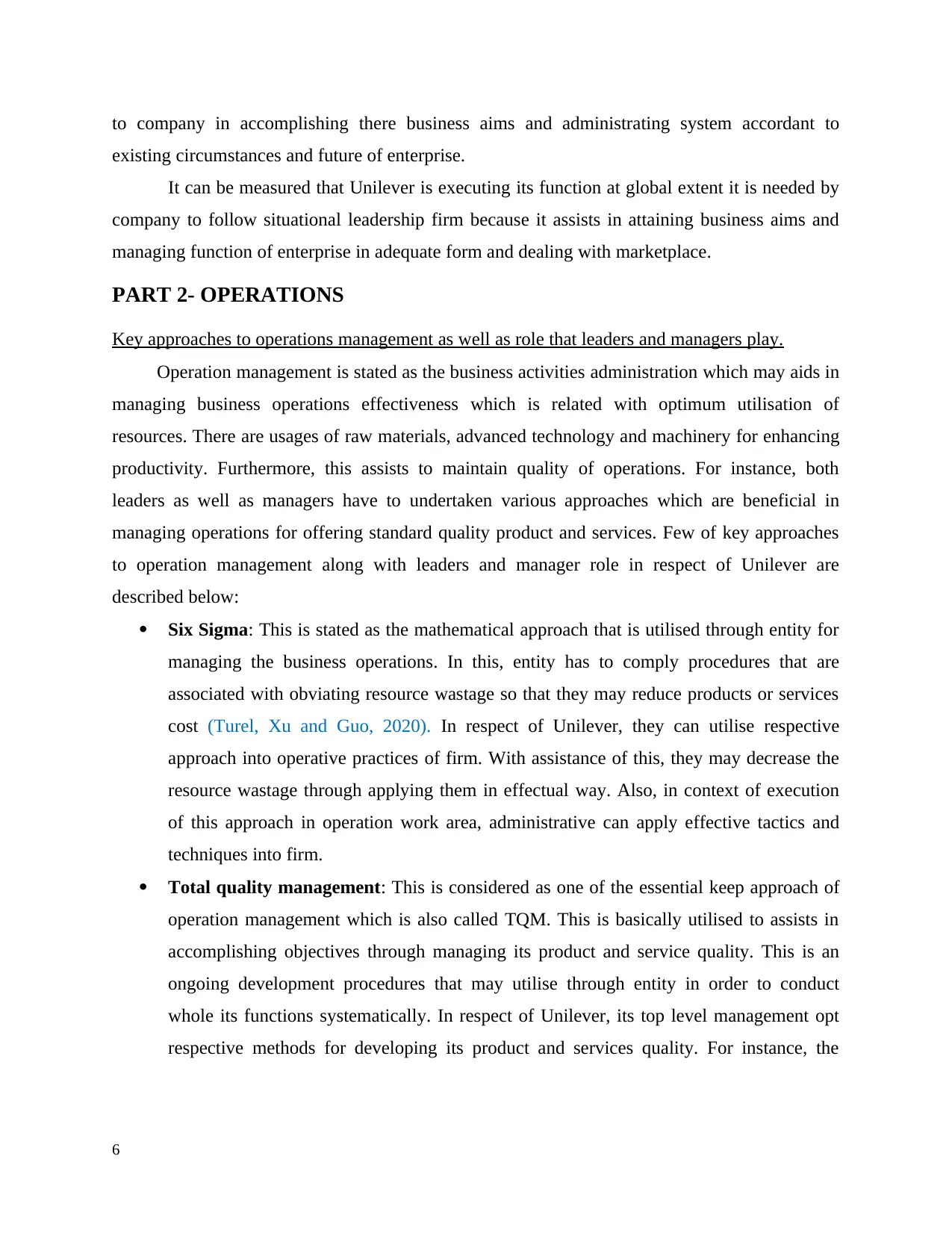
to company in accomplishing there business aims and administrating system accordant to
existing circumstances and future of enterprise.
It can be measured that Unilever is executing its function at global extent it is needed by
company to follow situational leadership firm because it assists in attaining business aims and
managing function of enterprise in adequate form and dealing with marketplace.
PART 2- OPERATIONS
Key approaches to operations management as well as role that leaders and managers play.
Operation management is stated as the business activities administration which may aids in
managing business operations effectiveness which is related with optimum utilisation of
resources. There are usages of raw materials, advanced technology and machinery for enhancing
productivity. Furthermore, this assists to maintain quality of operations. For instance, both
leaders as well as managers have to undertaken various approaches which are beneficial in
managing operations for offering standard quality product and services. Few of key approaches
to operation management along with leaders and manager role in respect of Unilever are
described below:
Six Sigma: This is stated as the mathematical approach that is utilised through entity for
managing the business operations. In this, entity has to comply procedures that are
associated with obviating resource wastage so that they may reduce products or services
cost (Turel, Xu and Guo, 2020). In respect of Unilever, they can utilise respective
approach into operative practices of firm. With assistance of this, they may decrease the
resource wastage through applying them in effectual way. Also, in context of execution
of this approach in operation work area, administrative can apply effective tactics and
techniques into firm.
Total quality management: This is considered as one of the essential keep approach of
operation management which is also called TQM. This is basically utilised to assists in
accomplishing objectives through managing its product and service quality. This is an
ongoing development procedures that may utilise through entity in order to conduct
whole its functions systematically. In respect of Unilever, its top level management opt
respective methods for developing its product and services quality. For instance, the
6
existing circumstances and future of enterprise.
It can be measured that Unilever is executing its function at global extent it is needed by
company to follow situational leadership firm because it assists in attaining business aims and
managing function of enterprise in adequate form and dealing with marketplace.
PART 2- OPERATIONS
Key approaches to operations management as well as role that leaders and managers play.
Operation management is stated as the business activities administration which may aids in
managing business operations effectiveness which is related with optimum utilisation of
resources. There are usages of raw materials, advanced technology and machinery for enhancing
productivity. Furthermore, this assists to maintain quality of operations. For instance, both
leaders as well as managers have to undertaken various approaches which are beneficial in
managing operations for offering standard quality product and services. Few of key approaches
to operation management along with leaders and manager role in respect of Unilever are
described below:
Six Sigma: This is stated as the mathematical approach that is utilised through entity for
managing the business operations. In this, entity has to comply procedures that are
associated with obviating resource wastage so that they may reduce products or services
cost (Turel, Xu and Guo, 2020). In respect of Unilever, they can utilise respective
approach into operative practices of firm. With assistance of this, they may decrease the
resource wastage through applying them in effectual way. Also, in context of execution
of this approach in operation work area, administrative can apply effective tactics and
techniques into firm.
Total quality management: This is considered as one of the essential keep approach of
operation management which is also called TQM. This is basically utilised to assists in
accomplishing objectives through managing its product and service quality. This is an
ongoing development procedures that may utilise through entity in order to conduct
whole its functions systematically. In respect of Unilever, its top level management opt
respective methods for developing its product and services quality. For instance, the
6
Paraphrase This Document
Need a fresh take? Get an instant paraphrase of this document with our AI Paraphraser
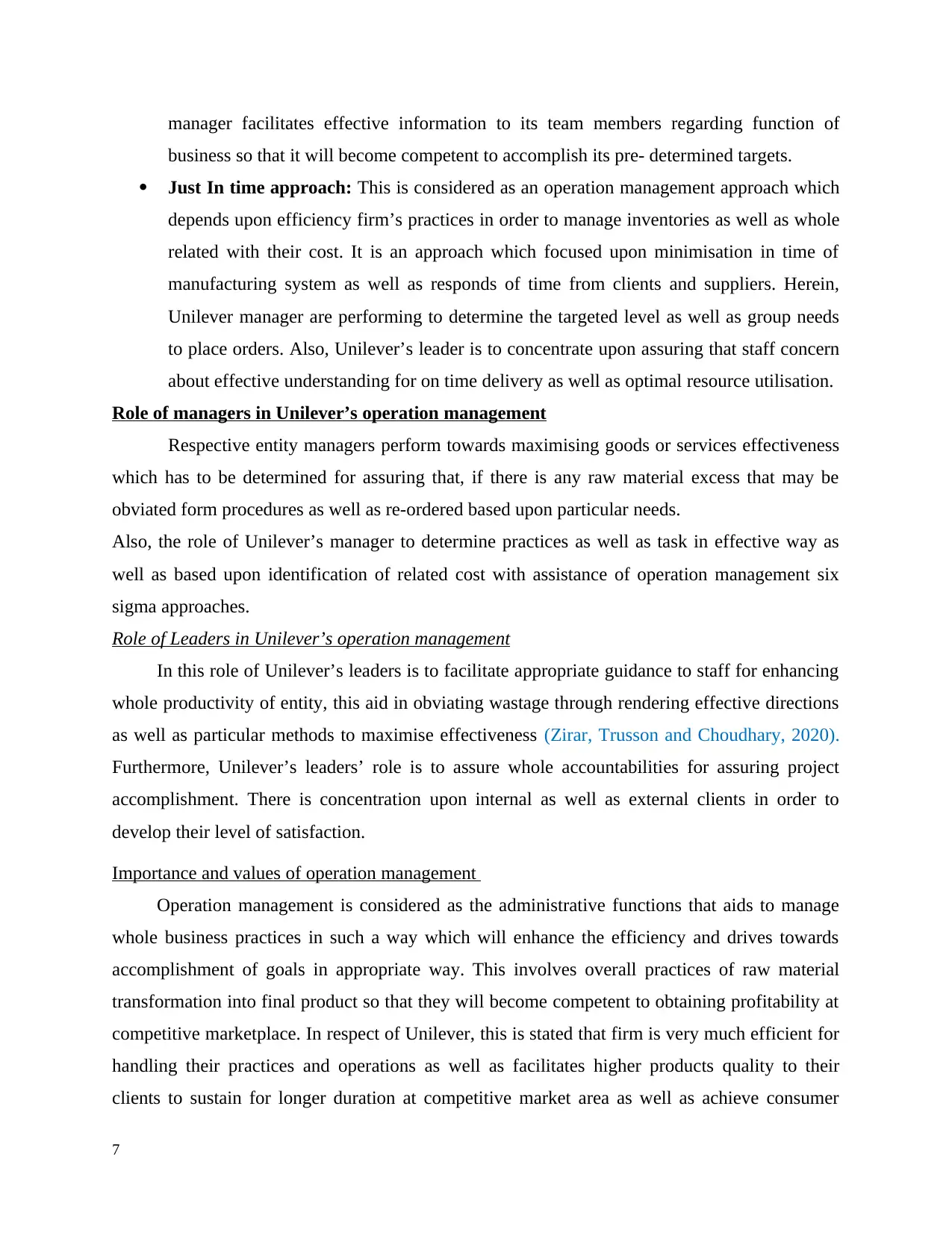
manager facilitates effective information to its team members regarding function of
business so that it will become competent to accomplish its pre- determined targets.
Just In time approach: This is considered as an operation management approach which
depends upon efficiency firm’s practices in order to manage inventories as well as whole
related with their cost. It is an approach which focused upon minimisation in time of
manufacturing system as well as responds of time from clients and suppliers. Herein,
Unilever manager are performing to determine the targeted level as well as group needs
to place orders. Also, Unilever’s leader is to concentrate upon assuring that staff concern
about effective understanding for on time delivery as well as optimal resource utilisation.
Role of managers in Unilever’s operation management
Respective entity managers perform towards maximising goods or services effectiveness
which has to be determined for assuring that, if there is any raw material excess that may be
obviated form procedures as well as re-ordered based upon particular needs.
Also, the role of Unilever’s manager to determine practices as well as task in effective way as
well as based upon identification of related cost with assistance of operation management six
sigma approaches.
Role of Leaders in Unilever’s operation management
In this role of Unilever’s leaders is to facilitate appropriate guidance to staff for enhancing
whole productivity of entity, this aid in obviating wastage through rendering effective directions
as well as particular methods to maximise effectiveness (Zirar, Trusson and Choudhary, 2020).
Furthermore, Unilever’s leaders’ role is to assure whole accountabilities for assuring project
accomplishment. There is concentration upon internal as well as external clients in order to
develop their level of satisfaction.
Importance and values of operation management
Operation management is considered as the administrative functions that aids to manage
whole business practices in such a way which will enhance the efficiency and drives towards
accomplishment of goals in appropriate way. This involves overall practices of raw material
transformation into final product so that they will become competent to obtaining profitability at
competitive marketplace. In respect of Unilever, this is stated that firm is very much efficient for
handling their practices and operations as well as facilitates higher products quality to their
clients to sustain for longer duration at competitive market area as well as achieve consumer
7
business so that it will become competent to accomplish its pre- determined targets.
Just In time approach: This is considered as an operation management approach which
depends upon efficiency firm’s practices in order to manage inventories as well as whole
related with their cost. It is an approach which focused upon minimisation in time of
manufacturing system as well as responds of time from clients and suppliers. Herein,
Unilever manager are performing to determine the targeted level as well as group needs
to place orders. Also, Unilever’s leader is to concentrate upon assuring that staff concern
about effective understanding for on time delivery as well as optimal resource utilisation.
Role of managers in Unilever’s operation management
Respective entity managers perform towards maximising goods or services effectiveness
which has to be determined for assuring that, if there is any raw material excess that may be
obviated form procedures as well as re-ordered based upon particular needs.
Also, the role of Unilever’s manager to determine practices as well as task in effective way as
well as based upon identification of related cost with assistance of operation management six
sigma approaches.
Role of Leaders in Unilever’s operation management
In this role of Unilever’s leaders is to facilitate appropriate guidance to staff for enhancing
whole productivity of entity, this aid in obviating wastage through rendering effective directions
as well as particular methods to maximise effectiveness (Zirar, Trusson and Choudhary, 2020).
Furthermore, Unilever’s leaders’ role is to assure whole accountabilities for assuring project
accomplishment. There is concentration upon internal as well as external clients in order to
develop their level of satisfaction.
Importance and values of operation management
Operation management is considered as the administrative functions that aids to manage
whole business practices in such a way which will enhance the efficiency and drives towards
accomplishment of goals in appropriate way. This involves overall practices of raw material
transformation into final product so that they will become competent to obtaining profitability at
competitive marketplace. In respect of Unilever, this is stated that firm is very much efficient for
handling their practices and operations as well as facilitates higher products quality to their
clients to sustain for longer duration at competitive market area as well as achieve consumer
7
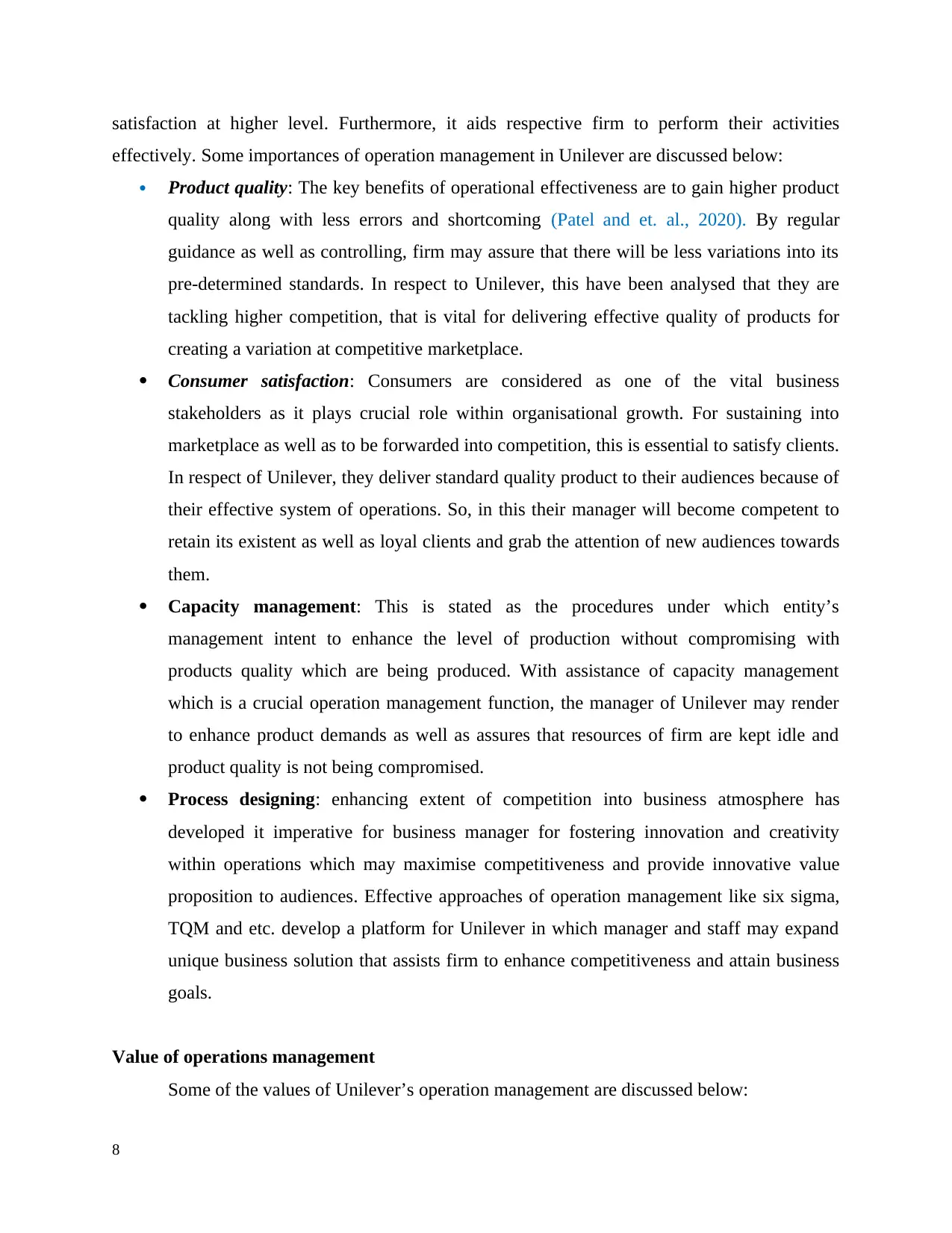
satisfaction at higher level. Furthermore, it aids respective firm to perform their activities
effectively. Some importances of operation management in Unilever are discussed below:
Product quality: The key benefits of operational effectiveness are to gain higher product
quality along with less errors and shortcoming (Patel and et. al., 2020). By regular
guidance as well as controlling, firm may assure that there will be less variations into its
pre-determined standards. In respect to Unilever, this have been analysed that they are
tackling higher competition, that is vital for delivering effective quality of products for
creating a variation at competitive marketplace.
Consumer satisfaction: Consumers are considered as one of the vital business
stakeholders as it plays crucial role within organisational growth. For sustaining into
marketplace as well as to be forwarded into competition, this is essential to satisfy clients.
In respect of Unilever, they deliver standard quality product to their audiences because of
their effective system of operations. So, in this their manager will become competent to
retain its existent as well as loyal clients and grab the attention of new audiences towards
them.
Capacity management: This is stated as the procedures under which entity’s
management intent to enhance the level of production without compromising with
products quality which are being produced. With assistance of capacity management
which is a crucial operation management function, the manager of Unilever may render
to enhance product demands as well as assures that resources of firm are kept idle and
product quality is not being compromised.
Process designing: enhancing extent of competition into business atmosphere has
developed it imperative for business manager for fostering innovation and creativity
within operations which may maximise competitiveness and provide innovative value
proposition to audiences. Effective approaches of operation management like six sigma,
TQM and etc. develop a platform for Unilever in which manager and staff may expand
unique business solution that assists firm to enhance competitiveness and attain business
goals.
Value of operations management
Some of the values of Unilever’s operation management are discussed below:
8
effectively. Some importances of operation management in Unilever are discussed below:
Product quality: The key benefits of operational effectiveness are to gain higher product
quality along with less errors and shortcoming (Patel and et. al., 2020). By regular
guidance as well as controlling, firm may assure that there will be less variations into its
pre-determined standards. In respect to Unilever, this have been analysed that they are
tackling higher competition, that is vital for delivering effective quality of products for
creating a variation at competitive marketplace.
Consumer satisfaction: Consumers are considered as one of the vital business
stakeholders as it plays crucial role within organisational growth. For sustaining into
marketplace as well as to be forwarded into competition, this is essential to satisfy clients.
In respect of Unilever, they deliver standard quality product to their audiences because of
their effective system of operations. So, in this their manager will become competent to
retain its existent as well as loyal clients and grab the attention of new audiences towards
them.
Capacity management: This is stated as the procedures under which entity’s
management intent to enhance the level of production without compromising with
products quality which are being produced. With assistance of capacity management
which is a crucial operation management function, the manager of Unilever may render
to enhance product demands as well as assures that resources of firm are kept idle and
product quality is not being compromised.
Process designing: enhancing extent of competition into business atmosphere has
developed it imperative for business manager for fostering innovation and creativity
within operations which may maximise competitiveness and provide innovative value
proposition to audiences. Effective approaches of operation management like six sigma,
TQM and etc. develop a platform for Unilever in which manager and staff may expand
unique business solution that assists firm to enhance competitiveness and attain business
goals.
Value of operations management
Some of the values of Unilever’s operation management are discussed below:
8
⊘ This is a preview!⊘
Do you want full access?
Subscribe today to unlock all pages.

Trusted by 1+ million students worldwide
1 out of 16
Related Documents
Your All-in-One AI-Powered Toolkit for Academic Success.
+13062052269
info@desklib.com
Available 24*7 on WhatsApp / Email
![[object Object]](/_next/static/media/star-bottom.7253800d.svg)
Unlock your academic potential
Copyright © 2020–2026 A2Z Services. All Rights Reserved. Developed and managed by ZUCOL.




